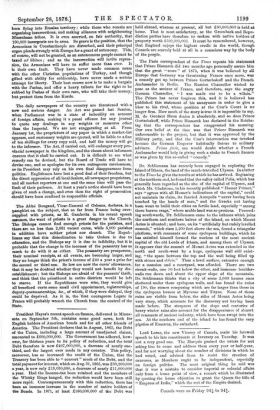Dr. Schliemann has recently been engaged in exploring the Island
of Ithaca, the land of the much-travelled Ulysses. In a letter to the Times he gives the results at which he has arrived. Beginning at the northern end, he found that the valley called Polis, which has generally been regarded as the site of the capital of Ulysses, and which Mr. Gladstone, in his recently published " Homer Primer," says "agrees with all Homer's indications of the capital," could not maintain its claim, its fancied Acropolis "never having been
touched by the hands of man," and the Greeks not having been wont to build their cities on fertile land, especially "among these barren crags," where arable land was so precious. Proceed- ing southwards, Dr. Schliemann came to the isthmus which joins the northern and southern halves of the island, on which Mount
Aetos is situated ; and here, on its "artificially but rudely levelled summit," which rises 1,200 feet above the sea, found a triangular platform, with remnants of some cyclopean buildings, which he has satisfied himself formed the nucleus of the most ancient capital of the old Lords of Ithaca, and among them of Ulysses. It appears that the summit of Mount Aetos was extended to the north and south-west by a huge, cyclopean wall still exist- ing, "the space between the top and the wall being filled up with stones and debris." Thus a level surface, extensive enough for a mansion and a courtyard, was afforded. There arc two circuit-walls, one 50 feet below the other, and immense boulder- walls run down and about the upper slope of the mountain. Dr. Schliemann thinks that a city of some 2,000 houses once sheltered under these cyclopean walls, and has found the ruins of 190, the stones composing which are far larger than those in the cyclopean houses at Mycenae and Tiryna. None of these ruins are visible from below, the sides of Mount Aetos being very steep, which accounts for the discovery not having been made before. The steepness of the slope and centuries of heavy winter rains also account for the disappearance of almost all remnants of ancient industry, which have been swept into the sea. At the southern end of the island he has found the very pigsties of Eummus, the swineherd.






























 Previous page
Previous page